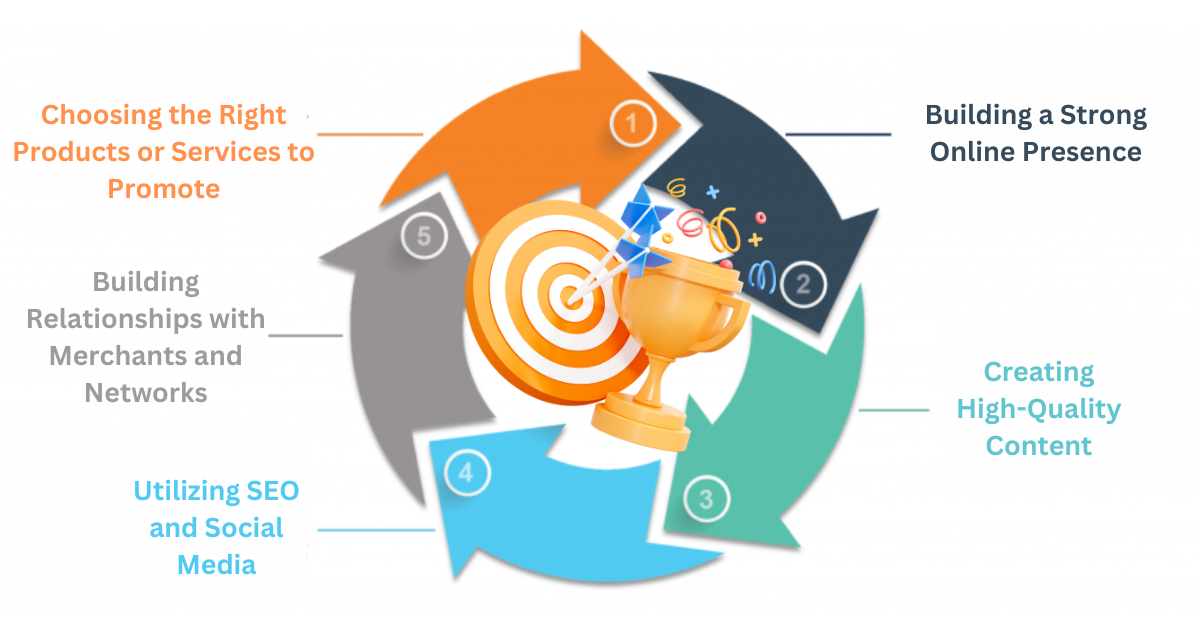One well-known digital marketing tactic that is essential to the current state of online businesses is affiliate marketing. In-depth explanations of affiliate marketing’s importance, operation, and ramifications within the field of digital marketing are provided in this article. This article offers crucial insights into the world of affiliate marketing, whether you’re a business owner, an aspiring marketer, or just interested in learning more.
Definition of Affiliate Marketing
Fundamentally, affiliate marketing is a performance-based marketing strategy in which companies, or merchants, collaborate with individuals or entities, called affiliates, to advertise their goods or services. Through their marketing initiatives, affiliates facilitate sales, generate leads, and drive traffic in exchange for commissions. In the age of digital marketing, this dynamic and results-driven strategy has become indispensable, promoting cooperative partnerships between publishers, advertisers, and customers.
The Growth and Relevance of Affiliate Marketing
The field of affiliate marketing has grown rapidly, particularly in the era of online entrepreneurship and e-commerce. Its appeal has been aided by its transparency, scalability, and adaptability. Upon finishing this article, you will possess a thorough comprehension of the functions played by merchants, affiliates, and customers within this marketing ecosystem. Additionally, you will recognize how affiliate marketing has transformed the way companies engage with their target market in the digital age.
Types of Affiliate Marketing
Pay-Per-Sale (PPS)
One of the most popular and simple affiliate marketing strategies is pay-per-sale, or PPS for short. A referred customer’s purchase earns an affiliate commission. Affiliates are compensated for generating real sales through a performance-based payment structure wherein the commission is usually a proportion of the sale value.
Pay-Per-Click (PPC)
Rather than paying affiliates for actual sales, pay-per-Lead (PPL) systems compensate affiliates for lead generation. Usually, these leads require taking steps like subscribing to a newsletter, finishing a survey, or giving contact details. PPL is helpful for companies trying to expand their customer base and cultivate relationships with prospective clients.
Two-Tier and Multi-Tier Programs
A multi-level framework is introduced through two-tier and multi-tier affiliate programs. Affiliates in a two-tier program receive commissions for both new affiliates they bring into the network and for direct referrals. Programs with many tiers may have more than two levels, forming a structure akin to a pyramid. A network of earning opportunities is created when affiliates can receive commissions from sales or leads that other affiliates many levels down in the hierarchy generate.
Success Strategies for Affiliate Marketing
Affiliate marketing is a complex business that pays off for those who use the appropriate approaches.
Choosing the Right Products or Services to Promote
Choosing goods or services that fit your audience and area of expertise is the first step toward success. Affiliates ought to concentrate on products that fit their niche and satisfy the requirements or passions of their audience. Additionally, as the quality of advertising is frequently a reflection of the affiliates’ true passion for the products, merchants should work with affiliates that share this passion.
Building a Strong Online Presence
A strong web presence is crucial, whether you’re an affiliate or a retailer. In order to establish credibility with prospective clients, merchants had to maintain polished and easily navigable websites. Conversely, affiliates ought to make a financial investment in a well-designed website or platform in order to properly display their material. It is crucial to maintain consistency in branding and messaging across all internet platforms.
Creating High-Quality Content
In the world of affiliate marketing, content is king. Affiliates ought to concentrate on creating excellent content that enlightens and engages their audience. This can be in the form of social media posts, blog entries, product reviews, or videos. In order to support affiliates in creating content, merchants should also furnish them with attractive marketing collateral and product details.
Utilizing SEO and Social Media
Social networking and search engine optimization (SEO) are two effective tools in the affiliate marketer’s toolbox. Affiliates can draw in more organic traffic by optimizing their content for search engines. Success on social media can be attributed to building a strong online presence, interacting with followers, and making use of sponsored advertising.
Building Relationships with Merchants and Networks:
Developing trusting relationships is essential for affiliates and merchants. Mutual success can result from open and honest communication as well as teamwork between the parties. Furthermore, being a member of affiliate marketing networks or platforms can offer beneficial tools and contacts that promote more seamless collaborations.
Success in the field of affiliate marketing frequently results from a carefully thought-out plan combined with perseverance and a desire to provide value to the audience.
How Affiliate Marketing Works
It is essential for merchants and affiliates alike to comprehend the workings of affiliate marketing. This section will go over how to set up an affiliate program, what affiliates are expected to do, and how important it is to monitor and evaluate performance.
Setting Up an Affiliate Program
Defining Objectives: Merchants need to set specific goals before they start their affiliate marketing journey. These goals may include boosting sales and brand recognition, entering new markets, or marketing a particular good or service.
Creating Affiliate Terms and Conditions: It is recommended that merchants create comprehensive terms and conditions for their affiliate program, including standards for compliance, commission structures, payment dates, and expectations. This paper helps to avoid misunderstandings and acts as a guide for affiliates.
Choosing Affiliate Tracking Methods: The foundation of affiliate marketing is efficient tracking. Merchants must choose tracking strategies that work for their business. To track affiliate-driven traffic and sales, this may entail using cookies, special affiliate links, or tracking software.
The Affiliate’s Role
Finding the Right Niche: Affiliates have to choose a specialty that fits both their audience and area of competence. This guarantees that their target demographic will find resonance in the goods or services they endorse.
Promoting Affiliate Products or Services: To advertise the merchant’s goods and services, affiliates produce advertising and content. This may be doing paid advertising, producing interesting content, sending out email marketing campaigns, or reviewing products.
Tracking and Measuring Performance
Metrics for Success: Both merchants and affiliates use key performance indicators (KPIs) to assess the success of their affiliate marketing campaigns. Return on investment (ROI), average order value, click-through rates, and conversion rates are examples of common KPIs.
Monitoring and Analyzing Data: Information is essential to affiliate marketing. Affiliates and retailers keep an eye on statistics to evaluate marketing efforts’ effectiveness. The program’s overall efficacy can be improved by modifications, optimization, and strategic decision-making made possible by this data analysis.
Merchants and affiliates must have a mutually beneficial partnership with defined goals, agreed-upon terms, and effective tracking methods for affiliate marketing to be successful. In turn, affiliates produce content that appeals to their audience and increases traffic and revenue for the retailer. Data measurement and analysis skills are critical for optimizing tactics and guaranteeing the program’s success.
The Benefits and Challenges of Affiliate Marketing
Like each marketing tactic, affiliate marketing has its own set of benefits and drawbacks. Knowing these can assist merchants and affiliates in making well-informed decisions regarding the product’s fit for their requirements.
Benefits
Low Entry Barriers: Affiliate marketing’s accessibility is among its most alluring benefits. There are few obstacles to participation, making it open to people and companies of all sizes. It’s available to everyone with an internet presence and doesn’t require a large initial investment.
Cost-Effective Advertising: Only when affiliates generate leads, sales, or other desirable actions do merchants pay commissions. This pay-for-performance strategy guarantees a certain return on investment and the effective use of advertising funds.
Diversified Marketing Channels: Affiliate marketers are able to advertise a variety of goods and services offered by various retailers. Because of this diversity, affiliates can become less dependent on a single source of income and have more freedom to experiment with other markets and niches.
Performance-Based Compensation: You get paid for affiliate marketing according to the real work you put in. Because their income is directly correlated with their performance, affiliates are therefore extremely motivated to produce high-quality marketing efforts. It harmonizes merchants’ and affiliates’ interests.
Challenges
Intense Competition: The competition has been more intense as affiliate marketing has increased in popularity. It may be difficult for new affiliates to succeed and establish themselves in a saturated niche.
Fraud and Unethical Practices: Regrettably, some dishonest people have also turned to fraud as a result of the performance-based paradigm. These include cookie stuffing and click fraud, which can be harmful to affiliates as well as businesses.
Legal Compliance and Transparency: Affiliate marketing must follow a number of rules and legal obligations, including consumer protection legislation and the disclosure of affiliate relationships. It can be difficult to navigate these legal nuances, and breaking the law might have consequences.
Strategies for Success in Affiliate Marketing
Strategic decisions are the foundation of success in affiliate marketing. Choose a niche that suits your area of expertise and the needs of your target audience. Establish a strong online presence. Concentrate on producing valuable content that fosters organic traffic growth and generates trust. Make use of efficient SEO techniques, vary your marketing avenues, and give credibility and trust top priority by supporting goods you genuinely believe in. Utilize data-driven insights to continuously analyze and optimize while keeping abreast of market developments. When used carefully, these tactics can open doors to success in the affiliate marketing industry, where providing value is essential.
Real-World Examples of Affiliate Marketing Success
Amazon Associates Program
One of the main components of successful affiliate marketing is Amazon Associates, which provides a wide range of products for affiliates to promote. Affiliates receive commissions on sales made through their referral links, and there are millions of alternatives available on the largest online marketplace in the world. Many successful affiliate marketers choose Amazon because of its wide range of products, diversity of offerings, and unmatched credibility.
ClickBank
Affiliates in the digital sphere can find refuge in ClickBank, an online marketplace. It provides a vast collection of digital goods, such as online courses, software, and e-books. ClickBank is distinguished by its high commission rates, which frequently exceed 75%. Because of this, affiliates in the digital products area will find it to be an appealing option.
Numerous people have used ShareASale to help them succeed financially in affiliate marketing. Pat Flynn, Ryan Robinson, and Michelle Schroeder-Gardner are a few examples. Selecting a niche that you are enthusiastic about and producing excellent content that appeals to your target audience are the keys to success. After completing this, you may begin advertising your affiliate links and collecting commissions from purchases.
Conclusion
Businesses and affiliates both benefit from affiliate marketing. Affiliates can make money by endorsing goods and services they are passionate about, and businesses can expand their consumer base and boost revenue. In order to succeed in affiliate marketing, you need to pick a niche you are enthusiastic about, produce excellent content, and sell your affiliate links wisely. Although affiliate marketing isn’t a get-rich-quick plan, it may be a very lucrative online income stream.
[FAQ]
Are there any risks in affiliate marketing?
While affiliate marketing can be profitable, it’s not guaranteed income. Success depends on the quality of the affiliate’s marketing efforts and the demand for the products or services they promote.
Are there any costs associated with affiliate marketing?
Typically, there are no upfront costs to join affiliate programs. However, you may invest in website hosting, domain names, or paid advertising to enhance your affiliate marketing efforts.
What are some effective affiliate marketing strategies?
Effective strategies include creating high-quality content, using email marketing, SEO, and paid advertising, building a strong brand, and maintaining transparency with your audience.













